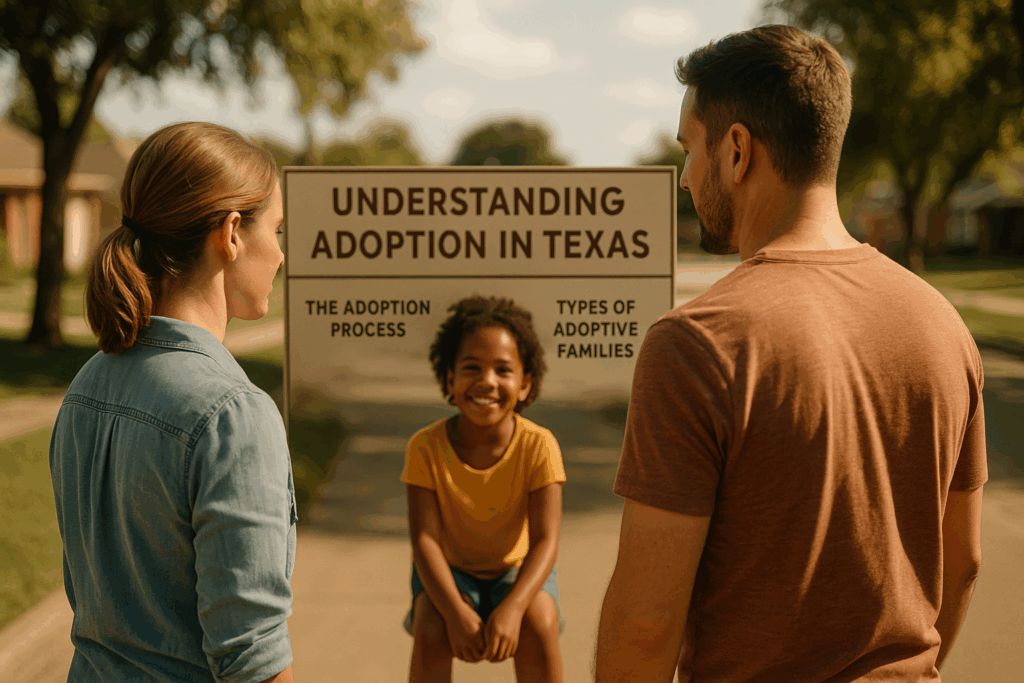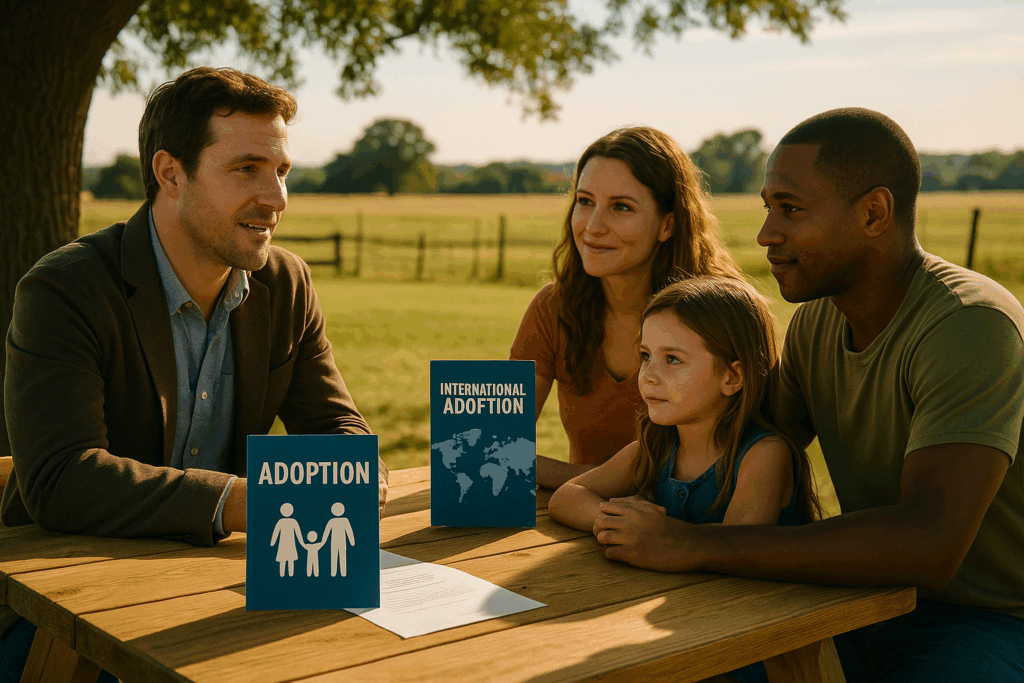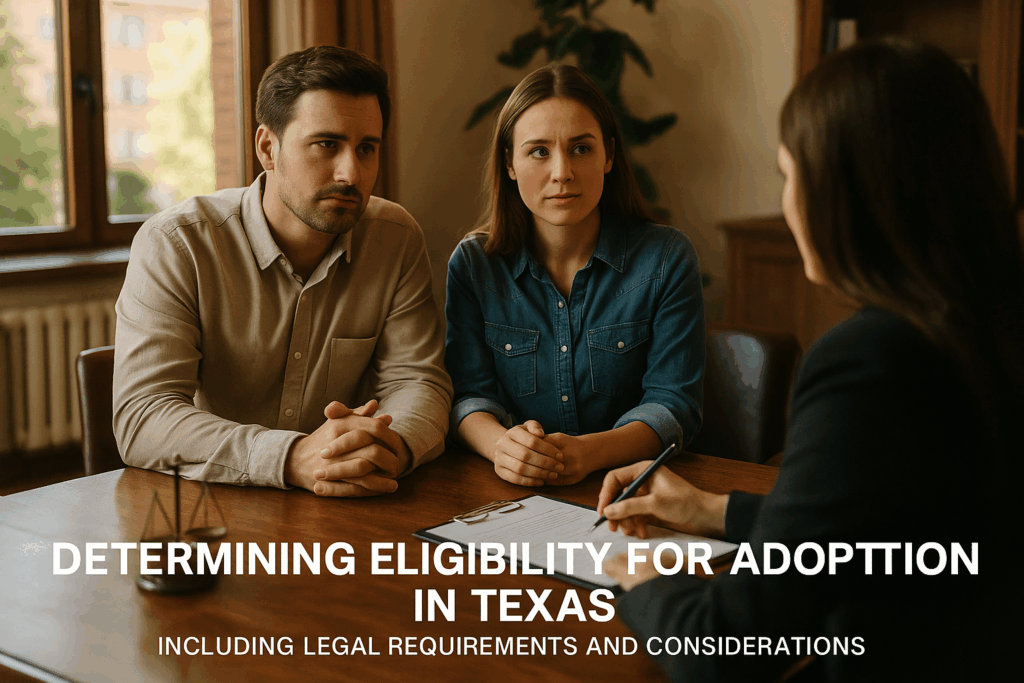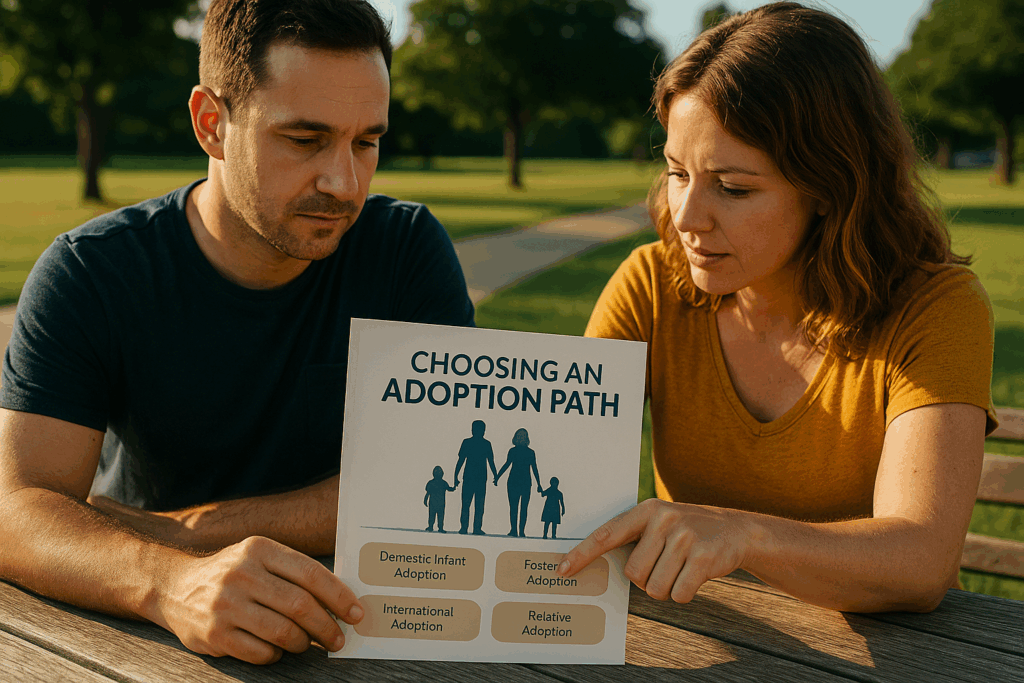
What do baking a cake, planning a wedding, and how to adopt a child in Texas have in common? They all come with a recipe—but the stakes are much, much higher when it’s about building a forever family. If you’ve ever found yourself staring at a screen, heart full and head spinning, wondering where to even begin with adoption, you’re not alone. And you’re in exactly the right place.
At The Law Office of Bryan Fagan, PLLC, we’ve walked alongside thousands of Texas families who’ve asked the same question: “How do I turn my dream of adopting into a reality?” The short answer? Adoption in Texas is absolutely possible—and incredibly rewarding—if you know the steps, stay informed, and have the right support team in your corner. This blog is your roadmap to making that happen.
Inside, we’ll unpack the different types of adoption (yes, there’s more than one), break down the legal process in plain English, and share real-life stories from families who’ve been where you are right now. You’ll learn how Texas law prioritizes the child’s best interest, what to expect from a home study, how to avoid common pitfalls, and how to protect your child’s educational and emotional stability—especially during life changes like divorce.
Whether you’re just starting to explore adoption, ready to file paperwork, or simply curious about your options, stick with us. By the end, you’ll feel more confident, more prepared, and a lot less overwhelmed. After all, this isn’t just about law—it’s about love, family, and building something real that lasts a lifetime.
Key Takeaways
- Adoption in Texas involves a series of legal steps designed to prioritize the child’s best interests, which include document submission, home studies, and court hearings.
- There are various types of adoption available in Texas, including domestic infant adoption, stepparent adoption, relative adoption, and foster care adoption, each with distinct procedures and requirements.
- Prospective adoptive parents must meet eligibility criteria such as age, financial stability, and training, while also navigating potential challenges such as contestations from biological parents.

Your Adoption Journey Starts Here
Don’t navigate the adoption process alone. Schedule a consultation today and receive the expert guidance and support you need to build the family of your dreams.
Understanding Adoption in Texas
Adoption in Texas is a meaningful and legally complex journey that brings a child into a permanent, loving home. Understanding how to adopt a child in Texas means navigating a process that is carefully structured under the Texas Family Code, primarily Chapter 162. This legal framework ensures every decision made during the adoption process aligns with the child’s best interests, from the initial filing of documents to the final court hearing.
As our family law team frequently advises, prospective adoptive parents often face questions about legal timelines, court requirements, and eligibility. The process begins with gathering essential documents and undergoing a home study, followed by filing a Petition for Adoption in the appropriate court. In many cases, the termination of the biological parents’ rights—either voluntary or involuntary—is a necessary step before the adoption can move forward.
A critical component of this journey is the home study, which assesses your readiness to provide a safe and supportive environment for a child. This requirement, outlined in Texas Family Code § 162.003, includes interviews, background checks, and home inspections. To better understand what this evaluation entails, families can review the Essential Texas Adoption Answers Home Study Checklist for helpful guidance.
Whether you are considering foster care, kinship, or stepparent adoption, it’s vital to stay informed and organized. For additional insight into the different types of adoption available, visit our resource on Types of Adoption in Texas, which outlines key options and what each path involves.
At The Law Office of Bryan Fagan, PLLC, we are committed to helping families understand the legal steps, avoid common pitfalls, and protect their futures. Our compassionate team of attorneys is here to ensure your adoption journey is supported by both sound legal counsel and the personal care your family deserves.

Types of Adoption Available in Texas
In Texas, there’s no one-size-fits-all approach when it comes to adoption. Understanding how to adopt a child in Texas begins with identifying the path that best fits your family’s circumstances and goals. Whether you’re considering welcoming a newborn, adopting a relative’s child, or providing a permanent home for a foster youth, Texas law offers several avenues—each with its own procedures and benefits under the Texas Family Code, particularly Chapter 162.
The most common types of adoption include domestic infant adoption, stepparent adoption, relative or kinship adoption, and foster care adoption. For instance, domestic infant adoption typically involves working with a licensed agency or private agreement with a birth mother. Stepparent adoptions, on the other hand, are often simpler when one biological parent voluntarily relinquishes their rights, making the legal process faster and more streamlined under Texas Family Code § 162.001(b).
Kinship or relative adoption allows extended family members to assume legal responsibility for a child when the biological parents are unable to provide care. This type of adoption maintains a sense of familiarity and often reduces emotional disruption for the child. Meanwhile, foster care adoption—often supported by state-funded services—is designed for families ready to adopt children who are already in the care of the Texas Department of Family and Protective Services. This path not only helps reduce the number of children in state care but may also come with financial support or subsidies.
Choosing the right adoption route depends on various factors including the child’s age, your relationship to the child, financial readiness, and the legal hurdles involved. To better understand the financial aspects of each path, including agency fees, court costs, and post-placement expenses, we recommend reviewing the Understanding the Average Cost of Adoption in Texas for a practical breakdown. Additionally, our blog post on foster care adoption in Texas offers insight into a lower-cost option with long-term impact.
According to the attorneys at our firm, the adoption process doesn’t just create legal ties—it creates lifelong connections. That’s why we’re dedicated to helping you make informed decisions rooted in both compassion and legal clarity. No matter the path, we’re here to support your journey every step of the way.

Domestic Infant Adoption
Domestic infant adoption involves adopting a newborn or infant, typically through private adoption agencies or independent adoptions. Prospective adoptive parents can choose to work with a licensed adoption agency that specializes in infant adoptions or pursue direct independent adoptions. This process often includes a matching procedure where adoptive parents are paired with a birth mother based on shared preferences and values.
A critical aspect of domestic infant adoption is the relationship between the adoptive parents and the birth mother. The adoption process allows for varying degrees of openness, including:
- Closed adoptions: no contact between parties.
- Open adoption: ongoing communication is maintained.
- Semi-open adoptions: some level of contact while maintaining privacy, offering a balanced approach.
Post-adoption, families need to consider the emotional and logistical impacts of the adoption. Open versus closed adoption agreements can significantly affect family dynamics and the child’s understanding of their background. It’s essential to have a clear adoption plan that outlines the level of contact between the birth family and the adoptive family, ensuring everyone’s comfort and well-being.
Stepparent Adoption
Stepparent adoption is a common type of adoption in Texas, where a stepparent adopts their spouse’s child. This process is generally streamlined, especially when the biological parent consents to the adoption. In these cases, the legal requirements are less complex, making it easier for families to solidify their bonds.
The biological parent’s consent is crucial in stepparent adoptions, ensuring the process proceeds smoothly and prioritizing the child’s best interests as an adoptive parent.
Stepparent adoption can provide a sense of stability and unity for the family, creating a legally recognized parental relationship.
Relative/Kinship Adoption
Relative or kinship adoption plays a vital role in Texas family law by allowing children to remain with familiar caregivers when their biological parents are unable to provide care. If you’re wondering how to adopt a child in Texas through kinship adoption, know that this path is often the most emotionally grounded and least disruptive for the child. As outlined in Texas Family Code § 162.005, kinship placements are strongly favored by the courts when they promote the child’s safety and continuity of care.
This type of adoption commonly involves grandparents, aunts, uncles, adult siblings, or even close family friends stepping in to provide long-term stability. Because the child already knows and trusts the adoptive family, this transition can be far smoother than traditional adoptions. Kinship adoptions help preserve a child’s cultural, emotional, and familial ties—something Texas courts recognize as being in the child’s best interest.
The legal process for kinship adoption typically includes background checks, a home study, and the termination of the biological parents’ rights. While the procedures may be less rigorous than non-relative adoptions, they still require careful compliance with state laws. Once finalized, the adoptive parents receive full parental rights and responsibilities, just as they would in any other form of adoption.
After the adoption is completed, adoptive families must also be aware of post-adoption responsibilities. These may include reporting requirements, updates for the child’s medical or educational records, and eligibility for support services. For a detailed overview of what happens after the court signs off, see our comprehensive guide: Navigating Texas Post-Adoption Requirements: Essential Guidelines for Parents.
At The Law Office of Bryan Fagan, our attorneys frequently assist families navigating kinship adoptions and the legal steps that follow. For additional insight into related topics, such as what to expect during a Texas home study, explore more resources on our blog. When you’re stepping up for a child you already love, you deserve trusted legal guidance to make that commitment official—and lasting.

Foster Care Adoption
Foster care adoption involves adopting children from the Texas foster care system. Prospective adoptive parents must meet specific eligibility criteria and complete mandatory training. This process ensures that the adoptive parents are well-prepared to provide a stable and nurturing environment for the child.
Adopting through the foster care system offers a unique opportunity to provide a permanent home for children who have been removed from their biological families due to various reasons. It requires a commitment to meet the specific needs of these children, who may have experienced trauma or instability in their lives.
The training and eligibility licensing requirements set by the state are designed to prepare prospective parents for the challenges and rewards of foster care adoption, with a few requirements that ensure the child’s transition into their new home is as smooth and supportive as possible.
Determining Eligibility for Adoption
When it comes to understanding how to adopt a child in Texas, one of the first steps is confirming that you meet the state’s eligibility requirements. Texas law, specifically Texas Family Code § 162.002, outlines clear criteria for prospective adoptive parents to ensure the child’s future home is stable, safe, and supportive. Whether you’re single, married, divorced, or widowed, the law welcomes a wide range of families—so long as they can provide a secure environment for a child in need.
At a minimum, adoptive parents must be at least 21 years old and financially self-sufficient. Proof of marital status, if applicable, must be submitted as part of the process. Every adult in the household is subject to a background check, which includes a review of any criminal history and a history of abuse or neglect. These checks are non-negotiable and help safeguard the child’s physical and emotional wellbeing.
Texas also requires all adoptive parents to complete pre-adoption training. This isn’t just about checking a box—it’s about preparing you for the real-life responsibilities and emotional challenges that may come with adoption. Topics often include trauma-informed care, attachment issues, and post-placement adjustment. This training reflects the state’s commitment to ensuring children are placed in homes where they can thrive.
A key element of the eligibility process is the adoption home study, which provides an in-depth evaluation of your living situation, family dynamics, financial readiness, and parenting approach. Conducted by a licensed social worker, the home study is required under Texas Family Code § 162.003 and is often one of the most involved parts of the journey. To better understand what to expect, we recommend reviewing the Top Components of a Texas Adoption Home Study Explained for a breakdown of each phase.
As our attorneys often emphasize, proper preparation is key to a successful adoption experience. For more practical tips on navigating this process, check out our blog post on how to prepare for a Texas home study. The more informed and organized you are from the beginning, the more confident and supported you’ll feel as you move forward toward building your family.

Choosing an Adoption Path
When exploring how to adopt a child in Texas, selecting the right type of adoption is one of the most important early decisions prospective parents will make. Texas offers several legal pathways—including domestic, international, foster care, and stepparent adoption—each with unique requirements, benefits, and challenges. These options are governed by Texas Family Code Chapter 162, which emphasizes that every adoption must serve the best interest of the child.
Domestic adoption is often more streamlined than international adoption, which requires additional oversight and compliance with federal and foreign laws. One key distinction in domestic adoption is the involvement of the birth mother, who often has the legal right to choose the adoptive family. This aspect adds a personal dimension to the process, helping ensure the placement aligns with the values and goals of both parties.
Stepparent adoption is one of the most common forms of adoption in Texas, especially for blended families seeking legal unity. As our family law team regularly advises, this process is generally more efficient when the non-custodial biological parent agrees to terminate their parental rights. According to Texas Family Code § 162.001(b), the court must confirm that the adoption promotes the child’s wellbeing and that the adoptive parent is a suitable legal guardian. For more detailed guidance, visit our in-depth article: Step-Parent Adoption in Texas: How It Works and What to Expect.
No matter which path you choose, adoption provides a powerful opportunity to grow your family with purpose and love. To further explore your options, check out our blog on types of adoption in Texas, or reach out to our compassionate legal team for personalized guidance. At The Law Office of Bryan Fagan, we’re here to make sure your journey to adoption is supported every step of the way—with experience, clarity, and care.

The Home Study Process
The adoption home study process is a critical step in the Texas adoption process, designed to assess the suitability of prospective adoptive parents. This process involves a thorough evaluation of the family’s home environment, financial stability, and overall readiness to adopt a child.
The home study involves interviews with household members, home inspections, and background checks. Prospective parents must provide various documents, including financial records, health assessments, and background checks for all adults in the household, as part of their family profile. Fingerprinting and criminal background checks are mandatory to ensure the child’s safety.
A home inspection evaluates the safety features, cleanliness, and child-friendly conditions of the living environment. Prospective parents must also demonstrate financial stability by providing relevant documents such as tax returns and pay stubs. Preparing for a successful home study involves organizing documents, practicing mock interviews, and maintaining open communication with the adoption specialist.
The legal steps in Texas adoption include:
- Filing a petition
- Completing a home study, which is a comprehensive process that ensures the adoptive family is ready to provide a loving and stable home for the child
- Attending a court hearing for finalization.
Legal Steps in the Adoption Process
The legal steps in the Texas adoption process are designed to ensure that the adoption is in the best interest of the child and complies with all state laws. The process includes:
- Termination of the birth parents’ parental rights, which can be either voluntary or involuntary based on specific grounds.
- Filing a Petition for Adoption in the appropriate district court by the prospective adoptive parents.
- Including various required documents with the petition, such as the child’s birth certificate and background checks.
The timeframe for adopting a child in Texas can vary significantly, typically ranging from several months to over a year, influenced by factors like the type of adoption and the specific circumstances of the case. Understanding these legal steps and timelines is crucial for prospective adoptive parents to navigate the adoption process effectively.

Submitting an Adoption Petition
Prospective parents initiate the adoption process by filing an adoption petition with the court. This petition includes:
- Various required documents such as background checks, financial disclosures, and the child’s birth certificate.
- Proper completion and submission of the petition.
- Signatures from both married adoptive parents to reflect mutual agreement and support for the adoption.
Consent forms from the biological parents, indicating voluntary relinquishment of parental rights, are also crucial in the adoption petition process. These documents ensure that the adoption is legally recognized and that the birth parents’ rights have been appropriately terminated.
Along with the petition, adoptive parents must provide proof of residency, demonstrating that the child has lived with them for a minimum of six months prior to filing the adoption petition. This residency requirement allows the court to assess the stability and suitability of the adoptive family.
The Adoption Hearing
During the adoption hearing, a judge reviews the adoption petition and supporting documents to ensure all legal requirements have been met before granting the adoption. This hearing is a critical step where the judge evaluates the suitability of the adoptive parents and the best interests of the child.
Adoptive parents are typically required to attend the adoption hearing, where they may answer questions posed by the judge regarding their suitability as parents. The judge may also review the home study report and other supporting documents to ensure that the adoption process has been thorough and compliant with state laws.
The adoption hearing culminates in the judge’s decision to finalize the adoption, granting the adoptive parents full legal rights over the child. If biological parents contest the adoption, legal steps are necessary to resolve the objections before legal completion can occur, and once those steps are completed, the adoption can be finalized.
Finalizing the Adoption
Before a child can be legally recognized as part of the adoptive family, an adoption finalization must occur in a Texas court. The finalization hearing generally takes place around six months after the child’s placement with the adoptive family. During this hearing:
- A judge reviews the post-placement visit report
- The judge reviews other required documents
- The judge ensures the family is adjusting well
- The judge confirms that safety measures are in place
Once the adoption is finalized, adoptive parents should apply for an amended birth certificate that lists their names as the legal parents. This new birth certificate is a vital document that legally recognizes the child as part of the adoptive family, providing them with all the rights and privileges of a biological child.
Post-finalization, adoptive families may continue to receive support services to help them adjust to their new family dynamics. These services can include counseling, support groups, and educational resources to ensure a smooth transition and ongoing family well-being.

The Role of an Adoption Attorney
An adoption attorney plays a crucial role in navigating the complex legal landscape of adoption. Their key responsibilities include:
- Ensuring compliance with Texas adoption laws
- Managing any legal issues that may arise during the adoption process
- Providing essential support by preparing and reviewing extensive documentation, including petitions and consent forms.
Representing clients in court, adoption attorneys ensure that all legal requirements are met for the adoption to be recognized. Their expertise in family law and adoption cases provides reassurance to adoptive families, making the process less daunting. Testimonials from clients highlight the importance of having knowledgeable adoption professionals at the agency to help navigate the complexities of the adoption process.
The Law Office of Bryan Fagan, PLLC is dedicated to supporting adoptive parents at every stage, from the home study to finalization. Their compassionate and effective approach ensures that families are well-prepared and confident throughout their adoption journey.
Support Services for Adoptive Families
The financial burden of adoption can be significant, with costs ranging from $20,000 to $45,000 or more. To help alleviate this burden, various support services are available to adoptive families. These services can include financial assistance, counseling, and educational support to ensure that families have the resources they need to thrive.
Respite care services provide temporary relief for adoptive families, allowing them to rest while ensuring their child is cared for. Additionally, educational support services, such as tutoring and mentoring, can assist adopted children in academic settings, helping them succeed and integrate smoothly into their new environment. These families often seek the same services to ensure consistency in care, including full service options.
Many prospective adoptive parents worry about the emotional impact of adoption on both the child and themselves. Support and guidance throughout the adoption journey are crucial to addressing these concerns and ensuring a positive adoption experience for all involved. Post-adoption services, including individual and family therapy, can help families navigate challenges and build strong, healthy relationships.
Common Questions and Concerns
Adopting a child can present various emotional and legal challenges. Potential issues such as the duration of the adoption process, objections from biological parents, and the requirements for single parent adoption are common concerns for prospective adoptive families. Addressing these questions can provide clarity and reassurance throughout the adoption journey.
Post-adoption services are available to help families adjust to their new dynamics and cope with any past trauma the child may have experienced. Financial assistance may also be available to help cover medical and financial needs related to the adoption of children with special requirements.

Duration of the Adoption Process
The duration of the adoption process can vary widely, often taking 18-24 months or longer. The typical waiting period for adoption in Texas ranges from nine to eighteen months, depending on various factors such as the type of adoption and the efficiency of the involved agencies.
Biological parents have the right to contest the adoption, which can complicate and lengthen the process. Understanding these potential timelines and challenges can help prospective adoptive families prepare for the journey ahead.
Objections from Biological Parents
In Texas, biological parents generally lose their legal rights upon adoption, but they may seek to overturn the adoption in rare cases involving fraud or coercion. Biological parents can contest an adoption if they have not legally relinquished their parental rights, which can complicate the adoption process.
Contested adoptions may arise from changing consent or questions regarding paternity. If biological parents contest the adoption, the court may require a hearing to determine if the objections are valid or if the adoption should proceed. These legal hearings can affect the timeline and outcome of the adoption process.
Resolving contested adoptions requires legal steps to address the objections and ensure that the adoption is in the best interest of the child, making it legally enforceable. Working with an experienced adoption attorney can help navigate these complexities and protect the rights of all parties involved.
Single Parent Adoption
Single individuals can adopt children in Texas, provided they meet the state’s legal requirements and demonstrate the ability to provide a stable home. Single adoptive parents must fulfill the same legal requirements as couples, including completing a home study and demonstrating financial stability.
The criteria for single parent adoption include being financially stable and having a suitable home environment. Single individuals do not need to own their home, as long as they can provide a stable and nurturing environment for the child.
Reassuring single hopeful parents about their ability to adopt is important. Many single individuals successfully adopt and provide loving homes for their children, contributing to a diverse and supportive adoptive community.
Key Steps and Adoption Types in Texas
Client testimonials illustrate the compassionate and effective approach of The Law Office of Bryan Fagan, PLLC in adoption cases. Anonymized testimonials from clients provide detailed accounts of their positive experiences with the adoption process. These testimonials serve to reassure and encourage prospective adoptive families, showing them they are not alone in their journey.
The Law Office encourages potential clients to reach out to previous clients for insights and support based on shared experiences. This peer support can be invaluable in navigating the emotional and practical aspects of adoption, providing a sense of community and shared understanding with other adoption professionals.
Conclusion:
Adopting a child in Texas is a complex yet rewarding journey, filled with legal, emotional, and practical considerations. By understanding the different types of adoption available, determining eligibility, and navigating the legal steps, prospective adoptive families can confidently move forward in their adoption journey. The role of an adoption attorney and the availability of support services are crucial in ensuring a smooth and successful adoption process.
The Law Office of Bryan Fagan, PLLC is dedicated to supporting adoptive families every step of the way. From the initial home study to the finalization hearing, their compassionate and knowledgeable team ensures that families are well-prepared and supported throughout the process. If you are considering adoption, take the next step by reaching out for a personalized consultation and trusted legal guidance.
Frequently Asked Questions About Adoption in Texas
How much does it cost to adopt a child in Texas?
The cost to adopt a child in Texas varies depending on the type of adoption. Private and agency adoptions can range from $20,000 to $50,000, while adopting through the foster care system is often free or may involve minimal costs.
What are the requirements to adopt a child in Texas?
Prospective adoptive parents in Texas must be at least 21 years old, financially stable, and pass background checks. They must complete a home study, provide references, and undergo adoption training.
Can my husband adopt my child without biological father’s consent in Texas?
In most cases, the biological father’s parental rights must be terminated before a stepparent adoption can proceed. However, if the father is absent, unresponsive, or has abandoned the child, the court may waive the requirement for consent.
What are the 6 steps of the adoption process?
The six steps of adoption typically include: 1) Decide on the type of adoption, 2) Complete a home study, 3) Match with a child, 4) Terminate biological parental rights, 5) File an adoption petition, and 6) Finalize the adoption in court.
What is the cheapest form of adoption?
Adopting through the Texas foster care system is generally the most affordable option, often costing little to nothing and sometimes including financial assistance or subsidies.
How long is the wait to adopt a baby in Texas?
The wait time to adopt a baby in Texas can range from 9 months to 2 years, depending on the type of adoption, the preferences of the adoptive family, and the circumstances of the birth parents.
What will disqualify you from adopting a child in Texas?
Disqualifying factors may include a criminal history involving violence or abuse, unstable financial or housing situations, a failed home study, or failure to meet Texas residency and background check requirements.
What are the 5 stages of the adoption process?
The five stages are: 1) Orientation and training, 2) Home study and preparation, 3) Matching with a child, 4) Placement and supervision, and 5) Finalization in court.
Do you get paid for adopting a child in Texas?
You do not get paid for adopting a child, but in foster care adoptions, you may receive subsidies or financial assistance to help cover the child’s needs.
Bryan Fagan is a Texas family law attorney with a heart for adoption—inspired not just by his legal career, but by his own family story. Growing up in Atascocita with two adopted brothers, Bryan learned early the profound meaning of chosen family. His passion for justice was sparked by John Grisham’s The Pelican Brief, and he became the first lawyer in his family, balancing night classes at South Texas College of Law while caring for his grandmother with Alzheimer’s.
Today, Bryan brings that same dedication to his practice, guiding families through adoptions, custody disputes, divorces, and complex marital agreements. A certified member of the College of the State Bar of Texas, he combines elite legal expertise with genuine empathy—drawing from his roles as a husband, father of three, and advocate for families facing false CPS allegations.
Based in Houston, Bryan is actively involved in the Houston Bar Association’s Family Law Sector and statewide family law organizations. Whether finalizing an adoption or protecting parental rights, he believes the law should reflect the deepest values of home, commitment, and love.

